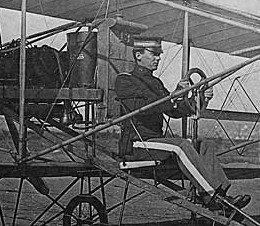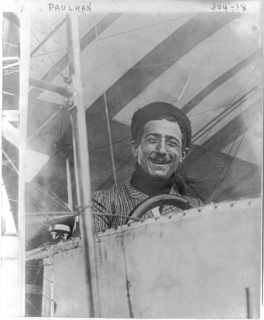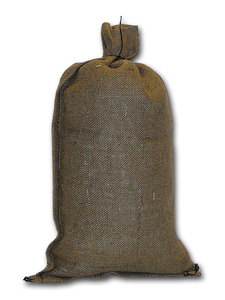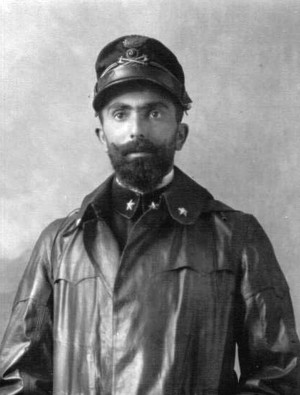 |  |
| Spiffy hat modeled by Lt. Paul Beck | Louis Paulhan |
Was it progress? In any case it was the founding of a new technology of war, one which would quickly move on from its crude origin. Their demonstration almost didn't come off. It is often believed that lawyers have ruined modern life, but there they were in 1910, trying even then to spoil everyone's fun. The Wright brothers, who had first demonstrated powered flight in 1903, had patented pieces of their aircraft and attempted to halt Paulhan's flight. Aviators aren't generally known for backing down from a challenge, though, and the normally peaceful life of an unsuspecting piece of dirt was, if not ended, at least momentarily interrupted by a pair of rudely placed sandbags.
 |  |
In 1911 Giulio Gavotti, a pilot serving in the Italian Army, first turned Paulhan's and Beck's theory into application when he pulled the pins from four grenades with his teeth, then dropped them onto a camp of Ottoman soldiers in Libya.
 |
| Guilio Gavotti |
The attack made news. "Aviator Lt. Gavotti Throws Bomb on Enemy Camp. Terrorized Turks Scatter upon Unexpected Celestial Assault," screamed the headlines. (In fact, a post-attack inquiry showed that the grenades had either failed to detonate or exploded harmlessly, and most of the soldiers were unaware they'd been attacked, but the media didn't let the truth get in the way of a good story.)
Certainly some kind of progression was occurring. From 4 Italian grenades in 1911...

...35 years later, technology had marched on a bit.
 |
| Operation Crossroads Never before had a war engulfing half the world been ended with the application of a mere two bombs. But this one was. And that has to be some kind of progress. |
No comments:
Post a Comment